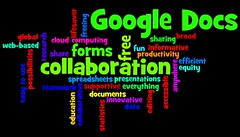 Image by Paul Worthington via Flickr
Image by Paul Worthington via Flickr- How do you find time to read and share all that information?
- As one working on a doctoral degree, raising a family, and working full-time, how do you find the time do anything?
- Do you ever sleep?
My Schedule
- 4:00 am - Wake Up
- 4:05 am - Check e-mail, Twitter, and Facebook via the Blackberry
- 4:15 am - Shower and dress
- 4:40 am - Eat breakfast while watching the morning news
- 5:00 am - Make lunch and coffee
- 5:10 am - Scan Google Reader
- 5:40 am - Leave house to meet up with carpool
- 6:00 am - Commute to work (if not driving, I will review Twitter and Google Reader)
- 6:50 am - Arrive at work
- 7:00 am - Check Numara Footprints help desk system for open, WIP, and SLA tickets
- 7:30 am - Check/compose e-mail
- 7:50 am - Check voicemail
- 8:00 am - Review web statistics in Google Analytics, Webmaster Tools, and Feedburner
- 8:20 am - Review and respond to MyEOL's bulletin board and Get Satisfaction
- 8:45 am - Review Google Reader for industry news, blogs, and latest happenings
- 9:30 am - Meet with Web Services team for our Daily Scrum
- 9:50 am - Write a blog
- 11:00 am - Meet with department liaison regarding updates to site
- 12:00 pm - Review Google Reader, Twitter, Facebook, e-mail, and voicemail for updates
- 1:00 pm - Work on the doctoral dissertation/Lunch
- 2:00 pm - Meet with ITS leadership concerning latest issues and opportunities
- 2:35 pm - Do a walk-a-round in the office and talk with ITS colleagues
- 3:15 pm - Review Google Reader, Twitter, Facebook, e-mail, and voicemail for updates
- 3:50 pm - Close down computer and straighten office
- 4:00 pm - Leave work
- 4:17 pm - Meet up with carpool and commute home (When not driving, I use my Blackberry to make calls or check upon social networking sites)
- 5:15 pm - Head to the gym
- 5:30 pm - Workout
- 6:40 pm - Finish workout and head home
- 6:55 pm - Get home and spend time with family
- 7:40 pm - Eat dinner
- 8:00 pm - Get ready for bed
- 8:15 pm - Work on dissertation while watching a little television
- 9:30 pm - Bedtime
Quick Tips
Zero Inbox
In the case of my e-mail, Facebook, Google Reader, and voice mail, I like to keep my inbox clean. This means that I rarely allow items to stack up past a day. During the times when I do check my various inbox locations, I will do one of the following things:
- Read: My first glance at the inbox reveals items that I am most interested in reading. This may include e-mails from my boss, team, key individuals on campus, family, or friends.
- Respond: After reading item, I will typically respond to sender with a short note. If the item requires a long response, or something more substantial, I add it to my to-do list.
- Archive: Meaningful items that I wish to keep for later retrieval are quickly ushered into the archive folder. At work, I keep just about everything that comes from coworkers and campus leaders.
- Act: About 20 percent of items that make it into my inbox require some form of action. Outside of a simple response, I need to do something with this information. If the action can be done within a few minutes, I will do it immediately. However, if it is something that requires more time, I will add it to my backlog of to-do items. For Google Reader, I will either send to Twitter, share, or e-mail to friends.
- Delete: With most of my inbox items, I delete them. I get a lot of spam, newsletters, e-mail group responses, and notifications/alerts. I spend a great deal of time moving these items into the trash bin. In the near future, I plan to set up more filters to remove much of this noise.
On both the Blackberry as well as the laptop, I find that keyboard shortcuts save time. My ability to see more information and channel it where it needs to go helps me do more in less time. Below are some of my favorite shortcuts.
Google Reader:
- J/K - Toggles up or down through the list of items
- Space Bar - Pages down
- S - Star (favorite)
- Shift-S - Shares item
- Shift-D - Shares item with a note
- D - Delete
- Delete - Delete
- I - Move item to a folder
Getting Things Done (GTD)
I have tried a number of strategies for completing tasks and often find myself going through each of them from time to time. The following are a couple of those items.
- Pen and Paper: Over the years, this has been my most successful approach. Each morning I review my list of things to complete and mark them off one by one. It can be a little tedious to write tasks over and over each day, but it helps remind me what is on my plate.
- Calendar: Much like a well run doctor's office, I use the desk or Outlook calendar to keep track of to-do items. Knowing that I can only do so much throughout the day, I make time to focus on important tasks. When my time is full, I move on to the next day. Just remember to leave some free time for unplanned items. It's better to anticipate the unknown than it is to assume an uneventful day.
- Eat the Frog: Taken from Brian Tracy's book Eat That Frog, I try to knock off the least fun and enjoyable things first. The sooner I get those things out of the way, the less stress I have and the more freedom to to the things I like. This takes a lot of discipline, but it can be done.
- Timebox: Borrowed from my experience with Scrum, I put a time frame on each task. I try to cut large projects, like my dissertation and web sites, down to manageable size chunks. At the end of my scheduled time, I have the option to keep working on the task or move on. In real life, I do not have the luxury to sit for hours working on one thing, so each task must help move the project forward. Although, I must admit my dissertation still looks overwhelming and I don't write as often as I should. I know it is sad, but true.
Managing ones time and resources is not easy. Each day brings new opportunities and challenges. Some of those challenges are from external influences, but most fall on me. My discipline gets called into question each minute of each day. At any given moment, I can follow my plan or choose to deviate from it. Some days I am very productive and other days I fail miserably. The aforementioned information serves as a guide for what I do most times. Therefore, do understand that I struggle like the best of them, but it is the sum of my efforts that helps me succeed.
Until next time...











